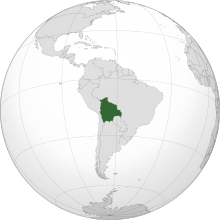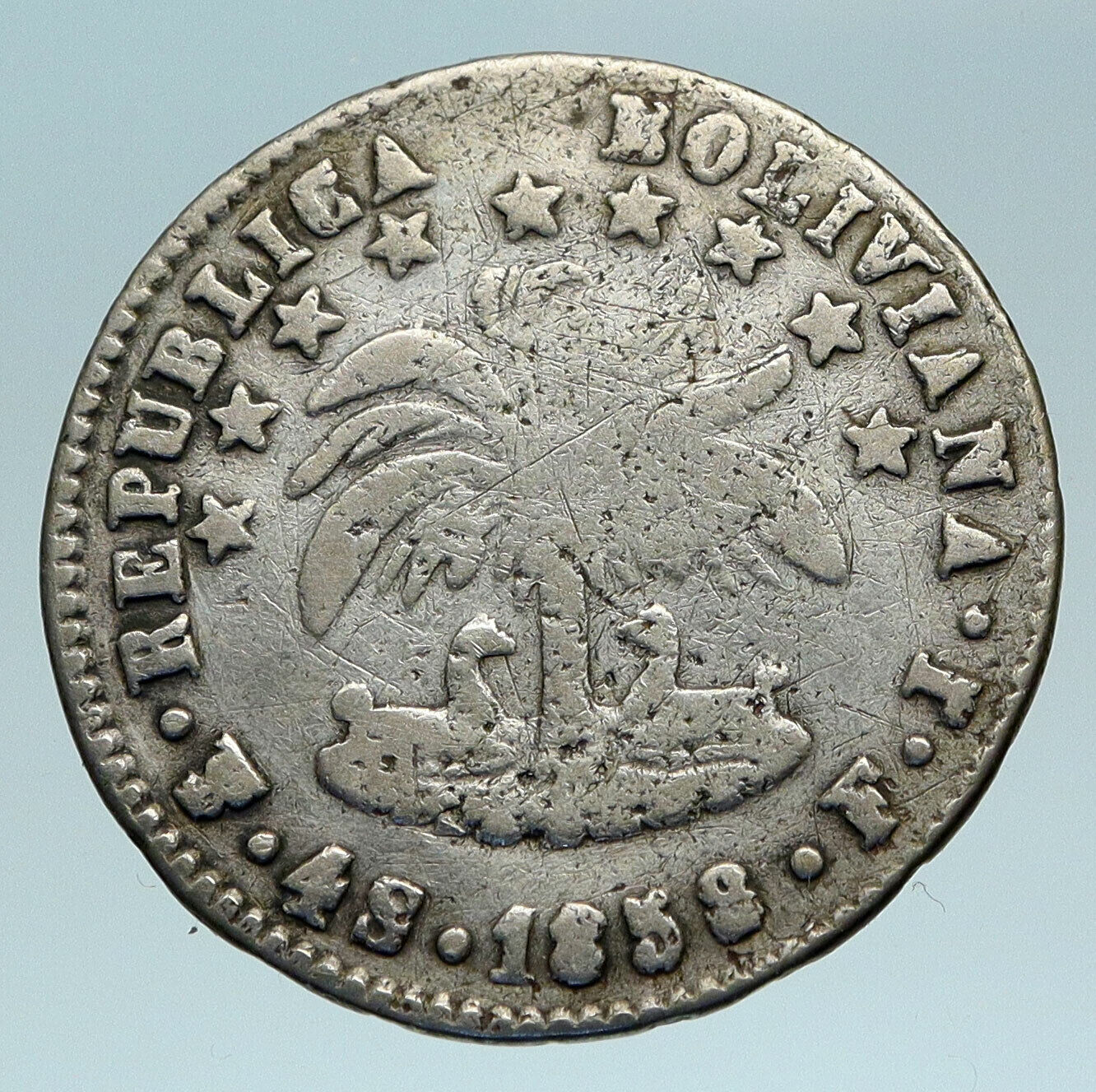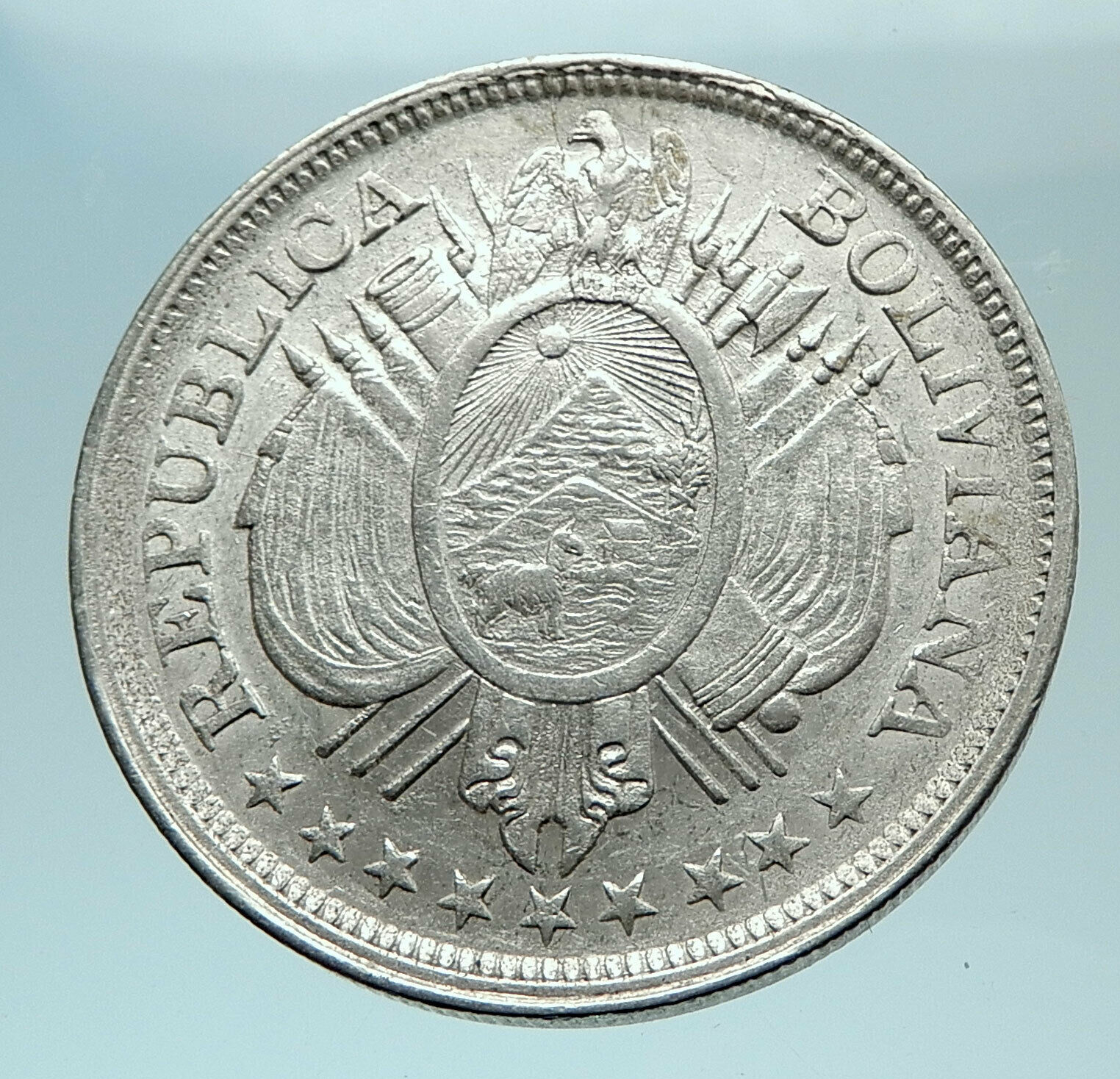|
Bolivia under Philip IV – King of Spain: 1621-1665
1652-1666 Silver 4 Reales 34mm x 31mm (11.19 grams) 0.931 Silver (0.4026 oz. ASW)
Reference: KM# 18, R# 18
Crowned cross of Jerusalem: lions and castles in quarters.
Crowned pillars and waves.
Coin Notes:
Previous KM reference was 18.1
You are bidding on the exact item pictured, provided with a Certificate of Authenticity and Lifetime Guarantee of Authenticity.
 Philip IV (April-June 1268 – 29 November 1314), called Philip the Fair (French: Philippe le Bel), was King of France from 1285 until his death (the eleventh from the House of Capet). By virtue of his marriage with Joan I of Navarre, he was also King of Navarre as Philip I from 1284 to 1305, as well as Count of Champagne. Although Philip was known as handsome, hence the epithet le Bel, his rigid and inflexible personality gained him (from friend and foe alike) other nicknames, such as the Iron King (French: le Roi de fer). His fierce opponent Bernard Saisset, bishop of Pamiers, said of him: “he is neither man nor beast. He is a statue.” Philip IV (April-June 1268 – 29 November 1314), called Philip the Fair (French: Philippe le Bel), was King of France from 1285 until his death (the eleventh from the House of Capet). By virtue of his marriage with Joan I of Navarre, he was also King of Navarre as Philip I from 1284 to 1305, as well as Count of Champagne. Although Philip was known as handsome, hence the epithet le Bel, his rigid and inflexible personality gained him (from friend and foe alike) other nicknames, such as the Iron King (French: le Roi de fer). His fierce opponent Bernard Saisset, bishop of Pamiers, said of him: “he is neither man nor beast. He is a statue.”
Philip relied on skillful civil servants, such as Guillaume de Nogaret and Enguerrand de Marigny, to govern the kingdom rather than on his nobles. Philip and his advisors were instrumental in the transformation of France from a feudal country to a centralized state. Philip, who sought an uncontested monarchy, compelled his vassals by wars and restricted feudal usages. His ambitions made him highly influential in European affairs. His goal was to place his relatives on foreign thrones. Princes from his house ruled in Naples and Hungary. He tried and failed to make another relative the Holy Roman Emperor. He began the long advance of France eastward by taking control of scattered fiefs.
The most notable conflicts of Philip’s reign include a dispute with the English over King Edward I’s fiefs in southwestern France, and a war with the Flemish, who had rebelled against French royal authority and humiliated Philip at the Battle of the Golden Spurs in 1302. In 1306, Philip expelled the Jews from France, and in 1307 he annihilated the order of the Knights Templar. He was in debt to both groups and saw them as a “state within the state”. To further strengthen the monarchy, Philip tried to take control of the French clergy, leading to a violent conflict with Pope Boniface VIII. This conflict resulted in the transfer of the papal court to the enclave of Avignon in 1309.
His final year saw a scandal amongst the royal family, known as the Tour de Nesle affair, in which Philip’s three daughters-in-law were accused of adultery. His three sons were successively kings of France, Louis X, Philip V, and Charles IV. Their deaths without surviving sons of their own would compromise the future of the French royal house, which until then seemed secure, precipitating a succession crisis that would eventually lead to the Hundred Years’ War (1337-1453).
.svg/125px-Flag_of_Bolivia_(state).svg.png) Bolivia, officially the Plurinational State of Bolivia (Spanish: Estado Plurinacional de Bolivia), is a landlocked country located in western-central South America. The capital is Sucre while the seat of government is located in La Paz. The largest city and principal economic and financial center is Santa Cruz de la Sierra, located on the Llanos Orientales (tropical lowlands) a mostly flat region in the east of Bolivia. Bolivia, officially the Plurinational State of Bolivia (Spanish: Estado Plurinacional de Bolivia), is a landlocked country located in western-central South America. The capital is Sucre while the seat of government is located in La Paz. The largest city and principal economic and financial center is Santa Cruz de la Sierra, located on the Llanos Orientales (tropical lowlands) a mostly flat region in the east of Bolivia.

It is constitutionally a unitary state, divided into nine departments. Its geography varies from the peaks of the Andes in the West, to the Eastern Lowlands, situated within the Amazon Basin. It is bordered to the north and east by Brazil, to the southeast by Paraguay, to the south by Argentina, to the southwest by Chile, and to the northwest by Peru. One-third of the country is within the Andean mountain range. With 1,098,581 km2 (424,164 sq mi) of area, Bolivia is the 5th largest country in South America and the 27th largest in the world.
 The country’s population, estimated at 11 million, is multiethnic, including Amerindians, Mestizos, Europeans, Asians and Africans. The racial and social segregation that arose from Spanish colonialism has continued to the modern era. Spanish is the official and predominant language, although 36 indigenous languages also have official status, of which the most commonly spoken are Guarani, Aymara and Quechua languages. The country’s population, estimated at 11 million, is multiethnic, including Amerindians, Mestizos, Europeans, Asians and Africans. The racial and social segregation that arose from Spanish colonialism has continued to the modern era. Spanish is the official and predominant language, although 36 indigenous languages also have official status, of which the most commonly spoken are Guarani, Aymara and Quechua languages.
Before Spanish colonization, the Andean region of Bolivia was part of the Inca Empire, while the northern and eastern lowlands were inhabited by independent tribes. Spanish conquistadors arriving from Cuzco and Asunción took control of the region in the 16th century. During the Spanish colonial period Bolivia was administered by the Royal Audiencia of Charcas. Spain built its empire in great part upon the silver that was extracted from Bolivia’s mines. After the first call for independence in 1809, 16 years of war followed before the establishment of the Republic, named for Simón Bolívar. Over the course of the 19th and early 20th century Bolivia lost control of several peripheral territories to neighboring countries including the seizure of its coastline by Chile in 1879. Bolivia remained relatively politically stable until 1971, when Hugo Banzer led a coup d’état which replaced the socialist government of Juan José Torres with a military dictatorship headed by Banzer; Torres was murdered in Buenos Aires, Argentina by a right-wing death squad in 1976. Banzer’s regime cracked down on leftist and socialist opposition and other forms of dissent, resulting in the torture and deaths of a number of Bolivian citizens. Banzer was ousted in 1978 and later returned as the democratically elected president of Bolivia from 1997 to 2001.
Modern Bolivia is a charter member of the UN, IMF, NAM, OAS, ACTO, Bank of the South, ALBA and USAN. For over a decade Bolivia has had one of the fastest economic growths in Latin America, however it remains one of the poorest countries in South America. It is a developing country, with a medium ranking in the Human Development Index, a poverty level of 38.6 percent, and it has one of the lowest crime rates in Latin America. Its main economic activities include agriculture, forestry, fishing, mining, and manufacturing goods such as textiles, clothing, refined metals, and refined petroleum. Bolivia is very rich in minerals, especially tin.
|





 Philip IV (April-June 1268 – 29 November 1314), called Philip the Fair (French: Philippe le Bel), was King of France from 1285 until his death (the eleventh from the House of Capet). By virtue of his marriage with Joan I of Navarre, he was also King of Navarre as Philip I from 1284 to 1305, as well as Count of Champagne. Although Philip was known as handsome, hence the epithet le Bel, his rigid and inflexible personality gained him (from friend and foe alike) other nicknames, such as the Iron King (French: le Roi de fer). His fierce opponent Bernard Saisset, bishop of Pamiers, said of him: “he is neither man nor beast. He is a statue.”
Philip IV (April-June 1268 – 29 November 1314), called Philip the Fair (French: Philippe le Bel), was King of France from 1285 until his death (the eleventh from the House of Capet). By virtue of his marriage with Joan I of Navarre, he was also King of Navarre as Philip I from 1284 to 1305, as well as Count of Champagne. Although Philip was known as handsome, hence the epithet le Bel, his rigid and inflexible personality gained him (from friend and foe alike) other nicknames, such as the Iron King (French: le Roi de fer). His fierce opponent Bernard Saisset, bishop of Pamiers, said of him: “he is neither man nor beast. He is a statue.” .svg/125px-Flag_of_Bolivia_(state).svg.png) Bolivia, officially the Plurinational State of Bolivia (Spanish: Estado Plurinacional de Bolivia), is a landlocked country located in western-central South America. The capital is Sucre while the seat of government is located in La Paz. The largest city and principal economic and financial center is Santa Cruz de la Sierra, located on the Llanos Orientales (tropical lowlands) a mostly flat region in the east of Bolivia.
Bolivia, officially the Plurinational State of Bolivia (Spanish: Estado Plurinacional de Bolivia), is a landlocked country located in western-central South America. The capital is Sucre while the seat of government is located in La Paz. The largest city and principal economic and financial center is Santa Cruz de la Sierra, located on the Llanos Orientales (tropical lowlands) a mostly flat region in the east of Bolivia. 
 The country’s population, estimated at 11 million, is multiethnic, including Amerindians, Mestizos, Europeans, Asians and Africans. The racial and social segregation that arose from Spanish colonialism has continued to the modern era. Spanish is the official and predominant language, although 36 indigenous languages also have official status, of which the most commonly spoken are Guarani, Aymara and Quechua languages.
The country’s population, estimated at 11 million, is multiethnic, including Amerindians, Mestizos, Europeans, Asians and Africans. The racial and social segregation that arose from Spanish colonialism has continued to the modern era. Spanish is the official and predominant language, although 36 indigenous languages also have official status, of which the most commonly spoken are Guarani, Aymara and Quechua languages. 




